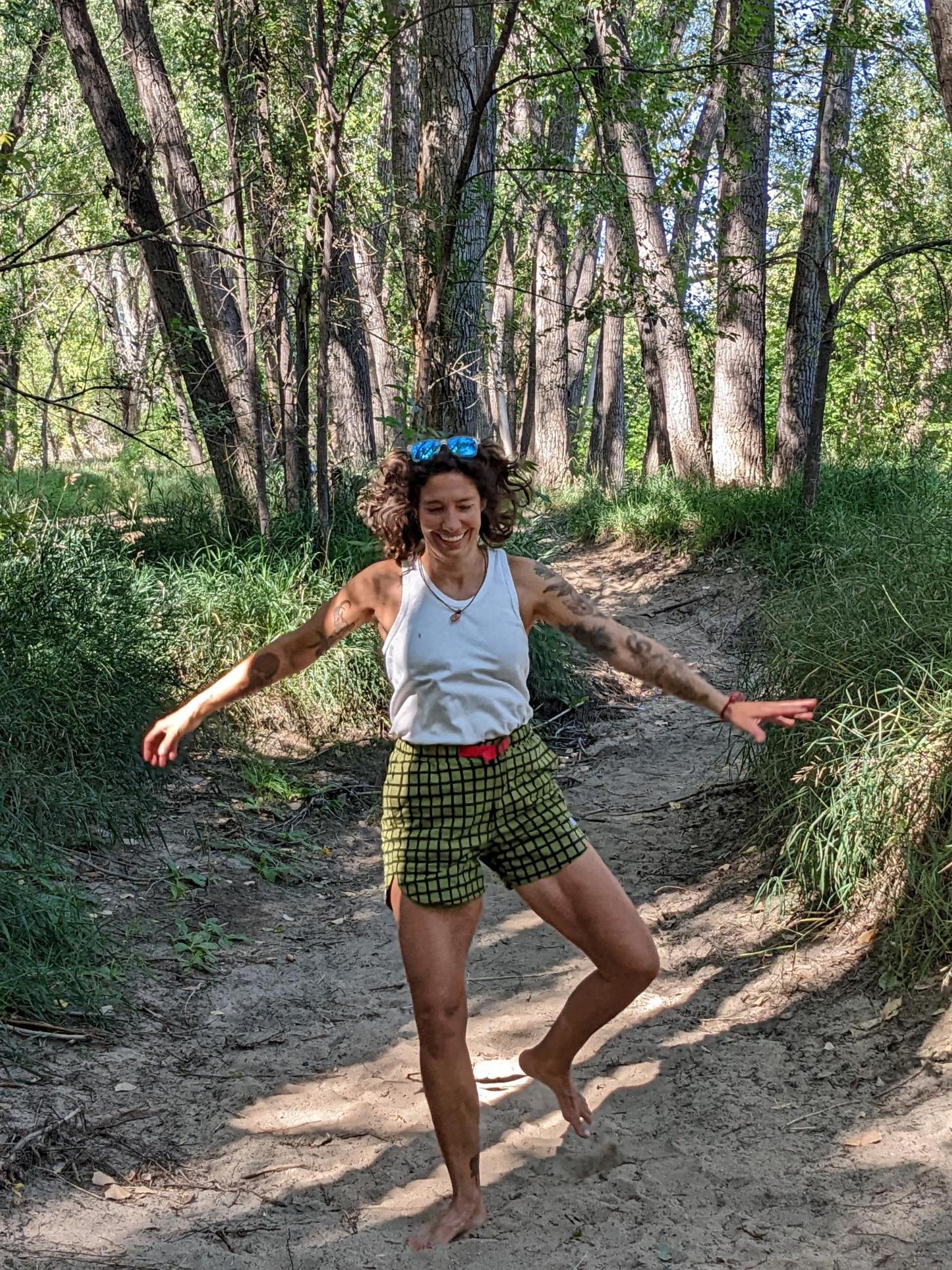Authentic Voice: What Does it Mean When You Go Along to Get Along
Did you know that we, humans, express 38% of emotional meaning through tone and rhythm of voice and only 7% through our actual words.* All the rest is done through body language. Wow.
My beloved captures me, authentically as I spider through the forest by the river.
What we express through our bodies and voice is who we are.
And now you know the science behind what I talked about last week with the practice of Experimental Threshold Crossings and how I’ve stopped shaving to push myself with giving fucks about bullshitery. Go back and read that one or even the one about Bee Who Taught Me to Sing.
Consider how critical embodying your authenticity and voice is to conveying anything to others - hell, even to yourself. We’ve all met those friends, leaders, or educators who say things that you don’t buy they even believe the words spewing out their mouths. Some of them/us may not even realize this because we’ve become so disconnected from our voice and disenfranchised from our bodies.
On my quest, I saw clearly my old ingrained pattern of “go along, to get along” through some of the practices we were invited to embody. Practices that asked our soul and true self to step into and share out with others we had just met.
Imagine all the protector voices that started going off, loudly!
I saw how that “go along, to get along” place kept me small, people pleasing, and chasing likability. It kept me from ever sharing my real perspective and instead a performative one - a ‘keep the peace’ one. Go along-ing also meant take actions that please others - like my shaving/not shaving convo last week. It’s the version of give all the fucks to other people’s opinions and expectations rather than knowing yourself.
I felt how that kept me from fully participating in loving life and aliveness because “go along, to get along” was the motto of my part - the One Who Holds Me Back (OWHMB). That part is a protector part from childhood.
Play it safe (because adults react erratically and there’s no pattern or routine to their displeasure).
Play small ( because you need to fly under the radar - don’t be noticed unless it’s for praise, see next requirement).
Play the good girl (because you want to achieve as the good kid and good student - this helps likability).
Play the performance (because everyone wants a girl/woman who smiles and isn’t intimidating and by intimidating I mean, achieve and be smart AF but goodgod don’t tell anyone).
In our next series of Grow Boldly, we are gonna be talking about this topic with some practices and reflections, sooooo click this button and come right back….
To prep for that though, here’s some ideas of what Harriet Lerner, the feminist psychologist [she’s written a lot on women’s anger if you’re interested - it’s call The Dance of Anger], says it means an authentic voice:
We can openly share competence as well as problems and vulnerability.
We can warm things up and calm them down.
We can listen and ask questions that allow us to truly know the other person.
We can say what we think and feel even when we know this may bring anger or disapproval from the other
We can allow others to say what they think and feel without needing to change, fix, or convince them.
We can define our values, convictions, principles, and priorities, and keep our speech and behavior congruent with these.
We can define what we feel entitled to in a relationship, and we can clarify the limits of what we will tolerate or accept in another’s behavior.
We can define our bottom line, that place where our core values, beliefs and priorities are not negotiable under relationship pressures.
What would you add or change to this list for yourself?
Lerner wrote in an interview with Maria Shiver that,
“The challenge in our relationships is not just to “find” our authentic voice but also to enlarge it, not just to be ourselves, but also to choose the self that we want to be.”
Buckle up, folks, we are diving into transformative change in order to dream and choose the YOU who wants to become!
What does living your authentic voice mean for you?
What is it to be authentic?
What is it to know and use your voice from that place of authenticity?

